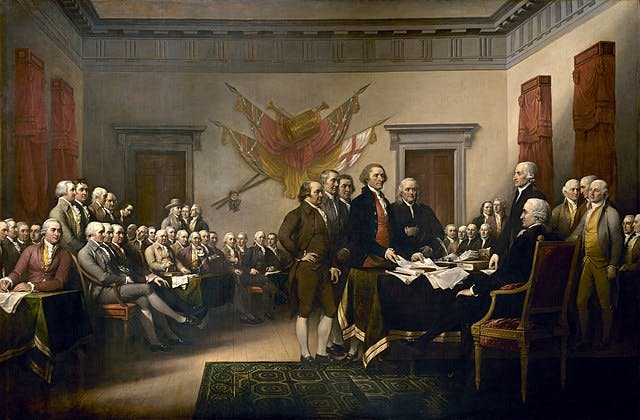On Independence Day, NPR Ditches Reading the Declaration
‘Morning Edition,’ one of America’s highest-rated public radio shows, abandons a 34-year-long Fourth of July tradition.

National Public Radio’s “Morning Edition,” one of America’s highest-rated public radio shows, has abandoned a 34-year-long Fourth of July tradition: reading aloud the Declaration of Independence.
While the outlet is officially a private company, it utilizes federal grants for a small percentage of its budget. This year, it chose to eschew a recitation of Thomas Jefferson’s masterpiece in favor of focusing on the meaning of “equality” within the parchment.
“This year we took a different direction in reading excerpts of the Declaration centered on the principle of ‘all men are created equal,’” is how NPR’s chief communications officer, Isabel Lara, explained it. NPR scheduled a discussion of that concept and its history with two Pulitzer-winning historians, Annette Gordon-Reed and Jill Lepore, both of Harvard.
In a tweet, host Leila Fadel announced that “instead of a reading of the Declaration of Independence,” the show would examine “what equality means and has meant in this document.” The broadcaster was established in 1967 by an act of Congress that was signed into law by President Johnson.
Explaining this departure from tradition, Ms. Lara insisted: “We are celebrating the spirit of July 4th by making this important history come alive through dialogue and debate.” The program aimed to tell the “whole story” of one of America’s founding texts.
The episode began with an exploration of what the statement of “all men are created equal,” in the Declaration of Independence’s first line, meant in the 18th century, when it was drafted. Mrs. Lepore offers that “the notion even that all white men are equal” was “a radical idea,” at the time.
The show focused on the ways that various marginalized groups, namely African Americans, women, and Native Americans, enlisted the Declaration of Independence in their push for equality.
NPR has come under fire in the wake of the departure of three high-profile women of color in the past year, Lulu Garcia-Navarro, Audie Cornish, and Noel King. Its chief people officer, Selyn Hong, insists that “NPR is committed to diversity, equity, and inclusion in our workplace, just as in its journalism.”
Last year, NPR provoked backlash — “Defund NPR” trended on Twitter — when its reading of the historical document included a disclaimer that the Declaration of Independence included “flaws and deeply ingrained hypocrisies.”

